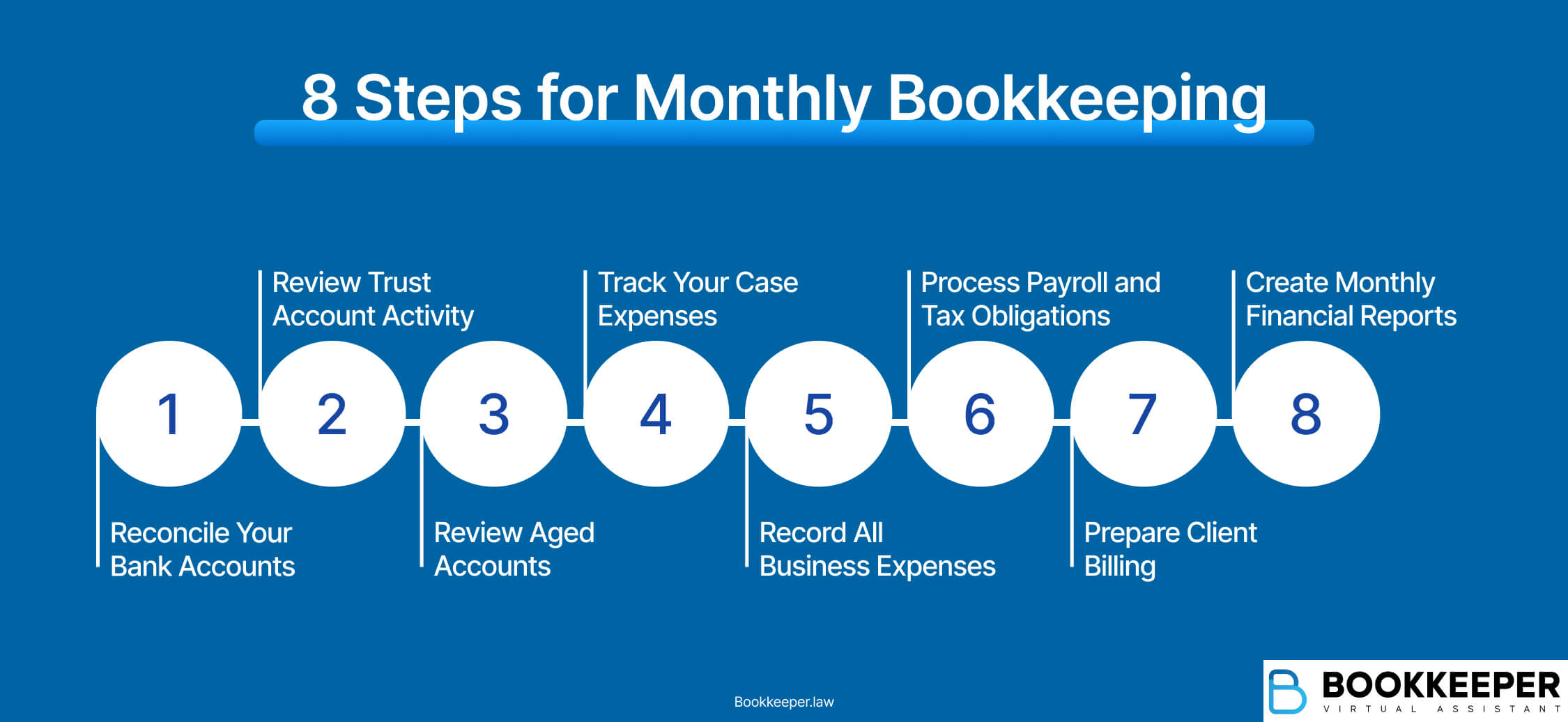Keeping your law firm’s books in order keeps you compliance and staying in control of your business. Yet many attorneys find themselves scrambling to understand their firm's financial health.
Monthly bookkeeping is your roadmap to sustainable practice growth. When you maintain accurate financial records month after month, you gain the insights needed to make informed decisions about staffing, case acceptance, and business investments. This checklist breaks down the essential monthly tasks that will keep your firm's finances organized.
8 Steps for Monthly Bookkeeping
1. Reconcile Your Bank Accounts
Begin each month by matching your bank statements with your accounting records. Check your operating account and trust account separately, looking for any differences between what your bank shows and what your books show. Watch for checks that haven't cleared yet, deposits that are still processing, and any bank fees. Your trust account needs extra attention since every dollar belongs to a specific client and must be tracked carefully.
2. Review Trust Account Activity
After reconciling your trust account, conduct a detailed review of transactions during the month. Make sure client retainers were deposited correctly, ensure earned fees were properly transferred to your operating account, and verify that case expenses came out of the right client's funds. Create a detailed trust account report showing each client's balance and any activity during the month.
3. Review Aged Accounts
Pull your accounts receivable report to see which clients haven't paid their invoices yet. Categorize outstanding receivables by age, which ones are 30 days overdue, 60 days, or 90+ days. This helps you spot which accounts need immediate follow-up and reveals whether your collection process is working effectively.
4. Track Your Case Expenses
Go through all the money you spent on client cases during the month. This includes court filing fees, expert witness payments, travel costs, and other case-related expenses. Make sure each expense is assigned to the correct client file so you can bill them accurately and understand which cases are most profitable.
5. Record All Business Expenses
Enter every business expense into your accounting system and put it in the right category for tax and management reporting purposes. This covers your office rent, utilities, software subscriptions, continuing education, bar dues, and liability insurance. Maintain digital copies of receipts and make sure they match what you entered in your books.
6. Process Payroll and Tax Obligations
If you have employees, process their monthly pay and ensure all employment taxes are calculated correctly. Verify that payroll taxes are deposited on time and employment tax returns are filed as required. Also review how your staff spent their time to ensure you're tracking billable versus non-billable hours correctly.
7. Prepare Client Billing
Create invoices for all the work you completed and costs incurred during the month. Double-check your time entries before sending bills to make sure they're accurate and complete. Verify that your invoices comply with applicable bar rules and client agreements regarding billing format and detail requirements.
8. Create Monthly Financial Reports
Generate your monthly profit and loss statement, balance sheet, and cash flow report. These reports provide insight into your firm's financial performance and help identify trends that require attention. Compare current month results to previous months and your budget to see your progress in meeting your financial goals.

Monthly Bookkeeping Checklist Template
Completed By:
Date:
✅ Bank Account Management
☐ Reconcile operating account with bank statement
☐ Reconcile trust account with bank statement
☐ Review and record bank fees
☐ Follow up on outstanding checks
☐ Confirm deposits in transit
✅ Trust Account Review
☐ Match client deposits to case matters☐ Transfer earned fees to operating account
☐ Deduct client costs accurately
☐ Generate trust balance report per client
☐ Review trust activity for compliance
✅ Accounts Receivable
☐ Generate aged accounts receivable report
☐ Categorize overdue invoices (30/60/90+ days)
☐ Identify accounts needing immediate follow-up
☐ Review collection patterns and trends
✅ Case Cost Management
☐ Record all court and filing fees
☐ Enter expert and third-party payments
☐ Track travel and case-related expenses
☐ Allocate costs to correct client matters
☐ Update case profitability tracking
✅ Case Cost Management
☐ Record all court and filing fees
☐ Enter expert and third-party payments
☐ Track travel and case-related expenses
☐ Allocate costs to correct client matters
☐ Update case profitability tracking
✅ Business Expense Recording
☐ Enter office rent, utilities, and subscriptions
☐ Input continuing education, bar dues, and insurance
☐ Categorize all other business expenses
☐ Attach digital receipts to all entries
✅ Payroll and Employment
☐ Process monthly payroll
☐ Calculate and deposit payroll taxes
☐ Review time tracking records
☐ Separate billable vs. non-billable hours
✅ Client Billing
☐ Review time entries for accuracy
☐ Generate and review invoices
☐ Include all billable case costs
☐ Verify compliance with bar billing rules
☐ Send invoices to clients
✅ Financial Reporting
☐ Generate profit and loss report
☐ Create balance sheet
☐ Prepare cash flow report
☐ Compare results to previous months
☐ Review performance against budget
You can download it here: Monthly Bookkeeping Template
Importance of Monthly Bookkeeping for Law Firms
Monthly bookkeeping transforms how you run your practice by giving you clear, real-time insight into your firm's financial health. Instead of wondering where your money went or scrambling to understand your cash position, you'll have the data you need to make smart business decisions.
Here's why consistent monthly bookkeeping is essential for law firms:
- Cash Flow Control: Monthly bookkeeping reveals your payment patterns and helps you predict cash flow gaps. You'll identify clients who pay within 30 days versus those who stretch to 90+ days, allowing you to plan expenses and manage vendor relationships proactively during slower periods.
- Client Trust and Compliance: Proper monthly trust account reconciliation protects your clients' funds and keeps you compliant with bar regulations. Regular billing also strengthens client relationships by clearly communicating the value you've provided, leading to faster payments and fewer disputes.
- Strategic Decision Making: When you track which practice areas generate the highest profits and which clients pay most reliably, you can make informed decisions about case acceptance and business development. This data helps you focus on profitable work while avoiding cases that drain resources without adequate returns.
- Tax Optimization: Organized monthly records ensure you capture every legitimate business deduction throughout the year. Proper categorization of expenses like continuing education, bar dues, and case costs can save thousands in tax liability while providing audit protection.
- Growth Opportunities: Monthly financial reports reveal trends that inform expansion decisions. When you understand your firm's financial health, you'll have the opportunity to allocate resources efficiently to the right investments for growth and business development.
Consistent monthly bookkeeping is the foundation for making informed business decisions and long-term success. At Bookkeeper.law, we specialize in providing bookkeeping services exclusively for law firms. Contact us today to learn how our bookkeepers can free you from financial burdens.





